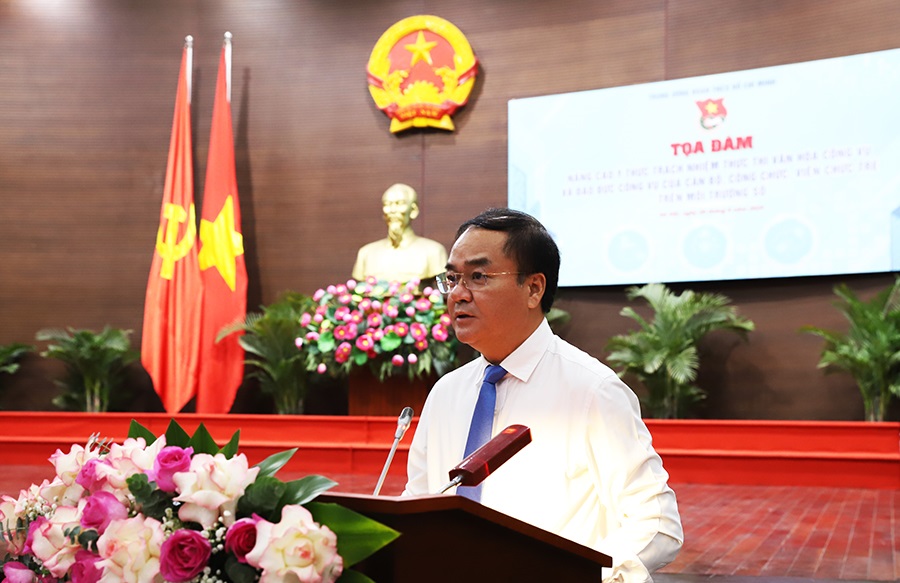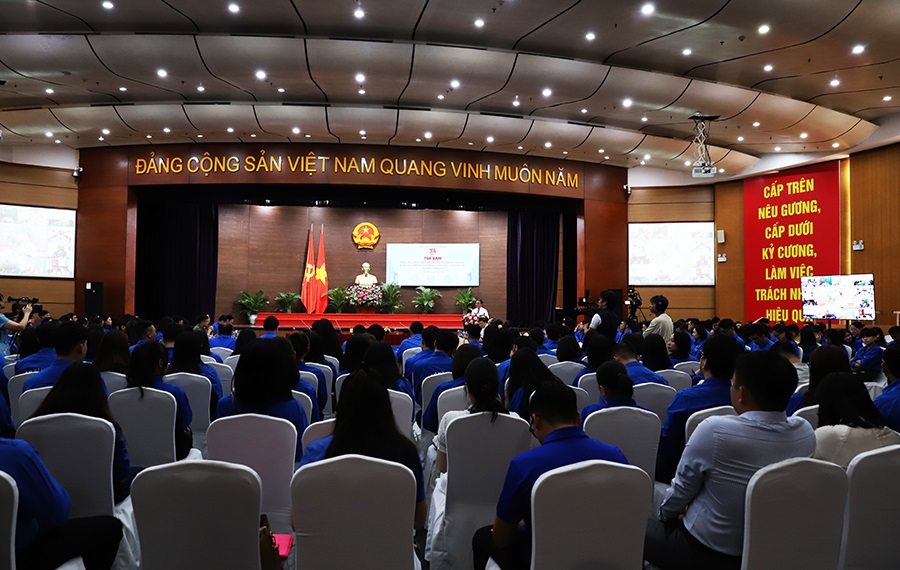Building a generation of Vietnamese youth, particularly young public officials, who are well-rounded, deeply patriotic, resilient, and proud of their nation; who possess ethics, civic awareness, and law compliance; and who master science and technology.
Vice Minister of Home Affairs Vu Chien Thang emphasized this in his welcoming speech at the Seminar “Building a Team of Young Public Officials for a Prosperous Viet Nam” with the theme “Enhancing the Awareness and Responsibility in Implementing Public Service Ethics and Culture of Young Public Officials in the Digital Environment”. This event was part of the 10th National Commendation Program for “Excellent Young Public Officials ” in 2024, taking place in Ha Noi on August 20, 2024.
In his welcome speech at the Seminar, on behalf of the MoHA leadership, Vice Minister Vu Chien Thang extended a warm welcome to the representatives from various central ministries, departments, and agencies attending at the Ha Noi venue, as well as to the delegates participating from 62 locations across the country. He also sent his warmest greetings and best wishes to all the youth members and young participants.
He emphasized that the Party and State of Viet Nam have always shown special concern for the youth, with the desire to build a generation of Vietnamese youth that is well-rounded, resilient, intelligent, and ambitious—one that fosters and nurtures great aspirations to become a formidable force that will carry forward the glorious legacy of the Party and the nation. This is deeply reflected in the Party’s resolutions and directives, as well as in the State’s policies and laws. To contribute to the vigorous promotion of youth-related policies and laws, and to make a profound, positive, and effective impact on youth development—especially in the context of digital transformation, building a digital government, digital society, and digital citizenship—the forum today holds significant meaning with the theme: “Enhancing the Awareness and Responsibility in Implementing Public Service Ethics and Culture of Young Public Officials in the Digital Environment”.
He noted that in recent times, MoHA has consistently supported and provided opportunities for youth in general, and specifically for the HCYU of MoHA. He expressed gratitude to the Standing Committee of the Central-level Agencies’ group HCYU for entrusting the HCYU of MoHA with the responsibility of organizing today’s Seminar. He also commended the HCYU Central Committee for organizing this meaningful and practical event.
In the context of the Fourth Industrial Revolution, where digital transformation plays a central role and is increasingly impacting all areas of the country’s economic and social life, the need to establish a digital cultural environment for the team of public officials is essential.
First, in implementing the Resolution of the 13th National Party Congress on digital government and digital economy, and the Politburo’s Resolution No. 52-NQ/TW on building a team of cadres, civil servants, and public employees that meet the demands of the Fourth Industrial Revolution, the Party of Viet Nam has always focused on building a team of public officials with sufficient qualities, capacities, and credibility to serve the people and contribute to the Viet Nam’s development.
According to Resolution No. 26-NQ/TW dated May 19, 2018, from the 7th Plenum of the 12th Central Committee, “On focusing on building a contingent of cadres at all levels, especially at the strategic level, with sufficient qualities, capacities, and credibility to meet the demands of their tasks,” personnel work is a critical element of Party and political system building. Investing in the development of a high-quality team of cadres, civil servants, and public employees is an investment in long-term and sustainable development. Building this team must be based on the demands and tasks of each revolutionary period through practical experience and the revolutionary movements of the people.
Implementing the Party’s Resolutions, MoHA has proactively and actively advised the Government and the Prime Minister to issue several important policies, such as: (1) Decree No. 73/2023/ND-CP dated September 29, 2023, on encouraging and protecting dynamic, creative officials who dare to think, dare to do, and dare to take responsibility for the common good; (2) Decision No. 899/QD-TTg dated July 31, 2023, approving the National Strategy on Talent Attraction and Utilization until 2030, with a vision to 2050; (3) Effectively implementing Decision No. 1847/QD-TTg dated December 27, 2018, of the Prime Minister approving the Public Service Culture Project; actively advising on directives and telegrams from the Prime Minister to strengthen discipline and order within state administrative agencies at all levels, implementing measures to combat the issues of buck-passing, avoidance, and lack of responsibility among public officials; (4) Advising the National Assembly to pass the Youth Law of 2020; advising the Government to issue Decree No. 13/2021/ND-CP regulating dialogues with youth; mechanisms, policies, and measures for implementing policies concerning youth aged 16 to under 18, among others.
Second, the goal is to build a generation of Vietnamese youth, in general, and a team of young public officials, in particular, who are well-rounded, deeply patriotic, resilient, and proud of their nation; who possess ethics, a sense of citizenship, and adherence to the law; who maintain health and a healthy lifestyle; who have culture, knowledge, education, life skills, careers, and employment; who master science and technology; thereby unleashing the power of youth, contributing to the creation of a “Professional, Responsible, Dynamic, Transparent, and Efficient” public service, in the context of international integration and digital transformation.
Third, building a team of public officials with a high level of education and a commitment to wholeheartedly serving the State and the People; executing public duties based on principles of respect, ensuring the legal rights and interests of citizens, and complying with legal regulations; prioritizing public interest, living simply, and avoiding self-interest or corruption.
Public officials must be dedicated to their work, use public assets efficiently and sparingly, and avoid authoritarianism, red tape, and harassment in their interactions with citizens and businesses. The true measure of their performance should be the tangible results of their work and the satisfaction level of citizens and organizations in public service execution.
Fourth, public officials need to enhance their adaptability and capitalize on the opportunities presented by the Fourth Industrial Revolution. This will allow them to maximize the effectiveness, potential, and value of data in digital transformation, serving the direction, management, and socio-economic development.
Building a high-quality workforce of public officials is essential, as they are the driving force behind positive changes in innovation and creativity, providing the motivation needed for the country to adapt to the rapid, comprehensive transformations of the Fourth Industrial Revolution, which is unfolding globally.
These factors demand a strong sense of responsibility, professionalism, diligence, integrity, and a dedication to serving the people. They also require a spirit of innovation, creativity, decisive action, and a willingness to take risks and make bold decisions—particularly among young public officials, who possess a high capacity for integration and can quickly absorb and apply scientific and technological advancements to the digital transformation process.
Vice Minister Vu Chien Thang believes that today’s Seminar will yield many valuable lessons to enhance the effectiveness and efficiency of public service culture and ethics among young public officials in the digital environment.





